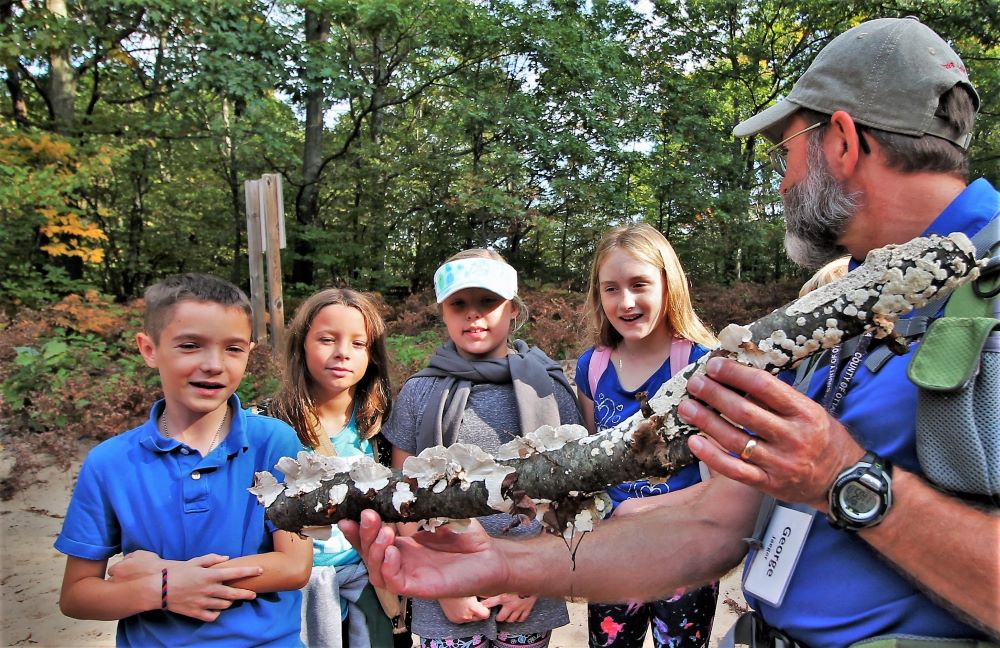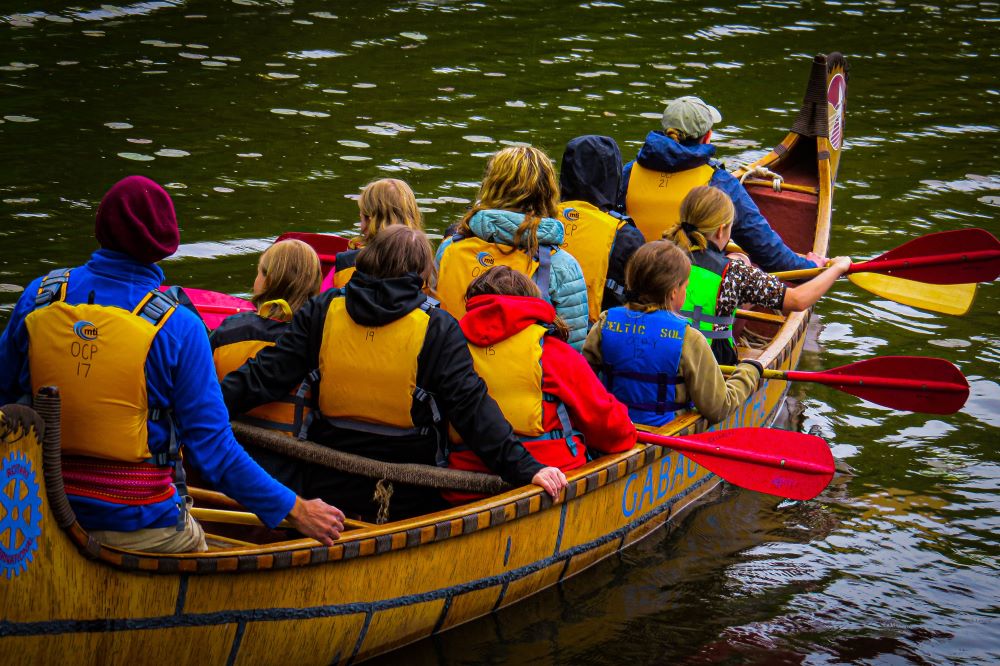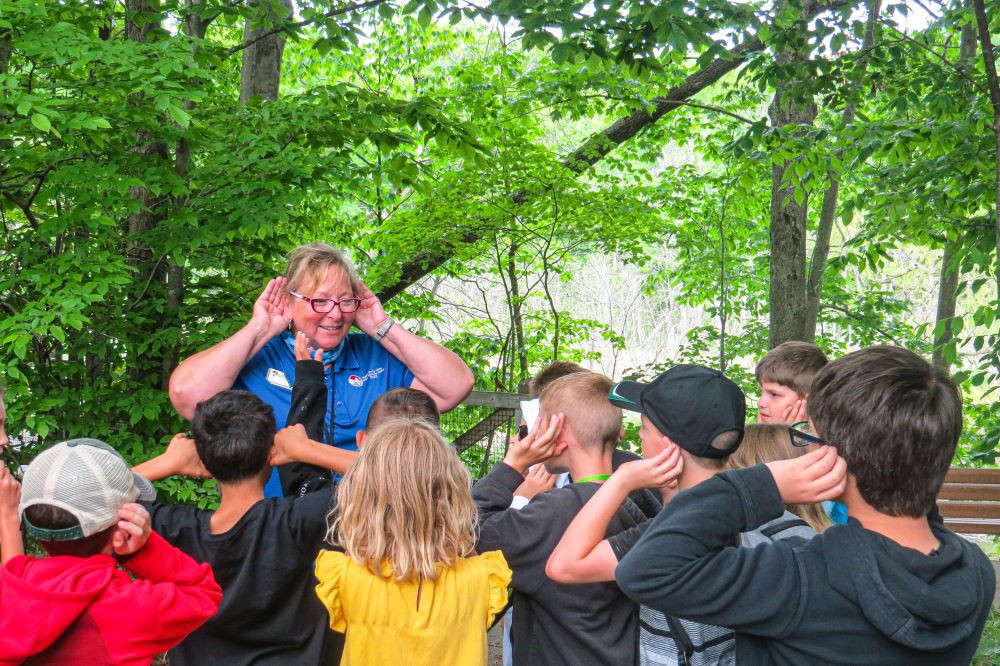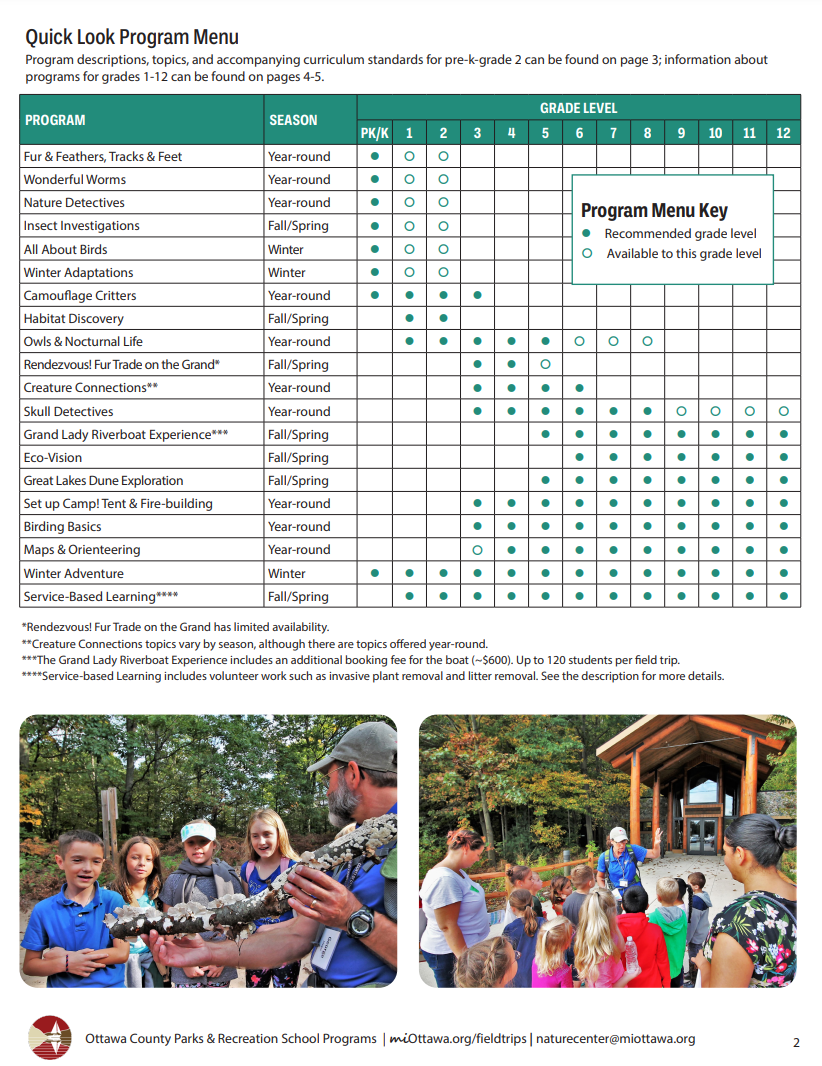School Programs & Field Trips
We invite you and your students to join us for a journey into the great outdoors of Ottawa County Parks!
Our professional outdoor educators provide field trips that are enriching, positive, and memorable, giving your students tangible experiences to relate back to what is taught in your classroom, no matter the season! We strive to:
- Initiate and encourage further exploration
- Nurture an emotional connection with nature
- Advance a wider perspective of students’ sense of place in the environment
- Promote a greater understanding and attitude of responsible stewardship
All programs meet Next Generation Science Standards; many also meet specific Michigan standards.
Program Length
Field trips for grade school students are typically 2-3 hours, plus a half hour for lunch (not provided). We offer a variety of nature-based program topics that can be paired together to best fit your classroom goals and interests. We also offer specialty programs that are three hours, plus a 30-minute lunch. Students will rotate through activities planned for each topic with a break in the middle for lunch.
| Example Schedule (grades 3-12) | |
|---|---|
| 9:30am-11:00am | Program Topic 1 |
| 11:00am-11:30am | Lunch Break |
| 11:30am-1:00pm | Program Topic 2 |
Contact us if you have questions about which program is best for your class.
Pricing
- Join us at a park/location in Ottawa County for $6 per student
- We can travel to you outside of Ottawa County for $8 per student + $50 travel fee (includes Muskegon, Kent, and Allegan)
- $100 minimum
- Teachers and aides included
- Parent chaperones included, based on grade and group size:
- Chaperone ratio of 5:1 for grades 1-12 (e.g. class of 25 = 5 chaperones allowed without additional charge)
- Chaperone ratio of 3:1 for pre-k/K
- Additional chaperones $6/person
Grades
-
Pre-K / Kindergarten
Each topic listed below is 60 minutes and can stand alone or be paired together, as long as they are offered in the same season. Every experience includes a foundational book or puppet show, sensory-based activities, and free exploration. Activities are focused on creating positive experiences of discovery and play in the outdoors to aid further engagement in the future.
- Camouflage Critters (Year-round)
- Now you see me! Now you don’t! Camouflage is nature’s game of hide-and-seek. How many critters can we find?
- LS1-2
- Fur & Feathers, Tracks & Feet
(Year-round)
- It’s an animal treasure hunt! Follow the clues to figure out who has been here.
- LS1-4, ESS3
- Nature Detectives (Year-round)
- We’ll use our five senses program to explore the outdoors. Using magnifiers and more, we’ll search for clues outside to discover who lives there.
- LS1-4, ETS2, PS4
- Wonderful Worms (Year-round)
- One of our most requested programs! Wiggle and Woggle will introduce you to decomposers and what makes worms so wonderful.
- LS1-4 ESS2, PS3
- Insect Investigations (Fall/Spring)
- How many legs does a bug have? Wait, is that a spider? Let’s count to figure it out! Using nets and magnifiers we will sleuth our way to learn more about the most abundant creatures on Earth.
- LS1-4, ETS2, PS4
- All About Birds (Winter)
- What makes a bird, a bird? So much to investigate about the different feathers, beaks, and nests of these backyard buddies.
- LS2-4, ESS2-3
- Winter Adaptations (Winter)
- Some animals migrate, some hibernate, and others insulate. We’ll explore what animals do in winter, how they stay warm, look for signs of who is awake, and study different animal track.
- LS1-4, ESS2-3
- Camouflage Critters (Year-round)
-
Grades 1 & 2
Choose two topics for your visit!
Each topic is 60 minutes and can be combined with another topic from a program within the same grade level and season. Students will be given a 30-minute lunch period in between topics (not provided).- Camouflage Critters (Year-round)
- Now you see me! Now you don’t! Camouflage is nature’s game of hide-and-seek. How many critters can we find?
- LS1-2
- Owls & Nocturnal Life (Year-round)
- Don’t be left in the dark, get en-light-ened on how an owl’s adaptations allow them to live nocturnally! You’ll also learn which owls can be found nearby, what sounds they make, and dissect owl pellets.
- PS3, LS 1-4, ESS3, ETS2
- Habitat Discovery (Fall/Spring)
- Students will discover the diversity of life in a variety of habitats, compare
living and nonliving features and discover how each habitat is similar or
different by learning about the plants and animals that survive in each.
- Wetland
- Forest
- Meadow
- LS1-4, ESS2-3
- Students will discover the diversity of life in a variety of habitats, compare
living and nonliving features and discover how each habitat is similar or
different by learning about the plants and animals that survive in each.
- Winter Adventure! (Winter)
- Adventure through the park by snowshoe, investigate animal tracks, and discover
how creatures prepare for and survive the winter season in a variety of ways.
- Whose Track is That?
- Winter Adaptations
- LS1-4, ESS2-3
- Adventure through the park by snowshoe, investigate animal tracks, and discover
how creatures prepare for and survive the winter season in a variety of ways.
Specialty Programs – choose only one!During these programs, students will participate in multiple stations over 3.5 hours (including 30 minutes for lunch). Elements of these programs cannot be paired with other topics.
- Service-based Learning (Fall/Spring)
- Service-based learning is a special segment of our volunteer and school programming. In addition to getting students outside and caring for our natural lands, it is an opportunity to connect students with the outdoors and our natural heritage. Students enjoy learning about ecosystems while improving them.
- Service-based learning workdays includes volunteer work such as invasive plant removal and litter removal, as well as an educational component.
- PS1, LS1-4, ESS2-3, ETS1-2
- Camouflage Critters (Year-round)
-
Grade 3
Choose two topics for your visit!
Each topic is 90 minutes and can be combined with another topic from a program within the same grade level and season. Students will be given a 30-minute lunch period in between topics (not provided).-
Creature Connections & Life Cycles
- How do creatures perpetuate themselves from season to season and year to year? Students will be introduced to the amazing strategies creatures use to complete their life cycles in a variety of different habitats.
- Forests & Trees (Year-round)
- Wetlands & Beavers (Year-round)
- Wetlands & Frogs (Spring)
- Meadows & Bluebirds (Spring)
- Meadows & Insects (Fall)
- LS1-4, ETS2, PS4
-
Camouflage Critters (Year-round)
- Now you see me! Now you don’t! Camouflage is nature’s game of hide-and-seek. How many critters can we find?
- LS1-2
-
Owls & Nocturnal Life (Year-round)
- Don’t be left in the dark, get en-light-ened on how an owl’s adaptations allow them to live nocturnally! You’ll also learn which owls can be found nearby, what sounds they make, and dissect owl pellets.
- PS3, LS 1-4, ESS3, ETS2
-
Skull Detectives (Year-round)
- Discover the variety of skull structures in different animals and learn how to key them out in a detective-style program that involves teamwork and hands-on activities.
- LS1-4, ESS3, ETS1-2
-
Set up Camp! Tent & Fire-building
(Year-round)
- Let’s go camping! Students will be challenged as they work together to perform some essential camping skills: Setting up a tent and building a campfire.
- PS1-3, LS2, LS4, ESS1-3, ETS1-2
-
Maps & Orienteering (Year-round)
- Smartphones down, compasses up! Students will learn how to use a compass and then work together to navigate the trails using their new skill.
- LS1-2, ESS2-3, ETS1-2
-
Birding Basics
- Students will sharpen their observation skills by learning how to use binoculars and identify birds by sight and sound. Then they will put their skills to use by watching birds at the bird feeders and outdoors.
- Bird Feeder Observations (Fall/Winter)
- Bird Songs Activity (Spring)
- LS1-4, ESS2-3, ETS2
-
Winter Adventure! (Winter)
- Adventure through the park by snowshoe, investigate animal tracks, and discover how creatures prepare for and survive the winter season in a variety of ways.
- LS1-4, ESS2-3
Specialty Programs – choose only one!
During these programs, students will participate in multiple stations over 3.5 hours (including 30 minutes for lunch). Elements of these programs cannot be paired with other topics.- Rendezvous! Fur Trade on the Grand River
(Fall/Spring)
- An active outdoor experience that aims to engage children in several activities that explain and demonstrate the life and times of Michigan’s fur trade. Set at Connor Bayou, a former rendezvous location.
- Students will rotate through the following:
- Furs in the Trade: Check out real furs and learn why the beaver was king.
- Early Life on the Grand: Learn about what early settlers and traders used and wore in their daily lives.
- Furopoly: Play a game to learn more about the fur trade.
- Story Time: Hear a story of the fur trade and engage in discussion.
- The Rendezvous: Play children's games of the fur trade era.
- Songs of the Voyageurs: Sing “Alouette” in the voyageur’s mother tongue.
- A Gabagouache Experience: Paddle an authentic reproduction of a voyageur canoe.
- LS1-4, ESS2-3, ETS 1
- Service-based Learning (Fall/Spring)
- Service-based learning is a special segment of our volunteer and school programming. In addition to getting students outside and caring for our natural lands, it is an opportunity to connect students with the outdoors and our natural heritage. Students enjoy learning about ecosystems while improving them.
- Service-based learning workdays include volunteer work such as invasive plant removal and litter removal, as well as an educational component.
- PS1, LS1-4, ESS2-3, ETS1-2
-
Creature Connections & Life Cycles
-
Grade 4
Choose two topics for your visit!
Each topic is 90 minutes and can be combined with another topic from a program within the same grade level and season. Students will be given a 30-minute lunch period in between topics (not provided).-
Creature Connections & Adaptations
- Using the springboard of a featured creature, students will look at how creatures are adapted for their role in each ecosystem as well as how they are connected to other organisms around them in the food web.
- Forests & Squirrels (Year-round)
- Forests & Woodpeckers (Year-round)
- Wetlands & Beavers (Year-round)
- Wetlands & Frogs (Spring)
- Meadows & Bees (Fall)
- Meadows & Bluebirds (Spring)
- LS1-4, ETS2, PS4
-
Owls & Nocturnal Life (Year-round)
- Don’t be left in the dark, get en-light-ened on how an owl’s adaptations allow them to live nocturnally! You’ll also learn which owls can be found nearby, what sounds they make, and dissect owl pellets.
- PS3, LS 1-4, ESS3, ETS2
-
Skull Detectives (Year-round)
- Discover the variety of skull structures in different animals and learn how to key them out in a detective-style program that involves teamwork and hands-on activities.
- LS1-4, ESS3, ETS1-2
-
Set up Camp! Tent & Fire-building
(Year-round)
- Let’s go camping! Students will be challenged as they work together to perform some essential camping skills: Setting up a tent and building a campfire.
- PS1-3, LS2, LS4, ESS1-3, ETS1-2
-
Maps & Orienteering (Year-round)
- Smartphones down, compasses up! Students will learn how to use a compass and then work together to navigate the trails using their new skill.
- LS1-2, ESS2-3, ETS1-2
-
Birding Basics
- Students will sharpen their observation skills by learning how to use binoculars and identify birds by sight and sound. Then they will put their skills to use by watching birds at the bird feeders and outdoors.
- Bird Feeder Observations (Fall/Winter)
- Bird Songs Activity (Spring)
- LS1-4, ESS2-3, ETS2
-
Winter Adventure! (Winter)
- Adventure through the park by snowshoe, investigate animal tracks, and discover how creatures prepare for and survive the winter season in a variety of ways.
- LS1-4, ESS2-3
Specialty Programs – choose only one!
During these programs, students will participate in multiple stations over 3.5 hours (including 30 minutes for lunch). Elements of these programs cannot be paired with other topics.-
Rendezvous! Fur Trade on the Grand River
(Fall/Spring)
- An active outdoor experience that aims to engage children in several activities that explain and demonstrate the life and times of Michigan’s fur trade. Set at Connor Bayou, a former rendezvous location.
- Students will rotate through the following:
- Furs in the Trade: Check out real furs and learn why the beaver was king.
- Early Life on the Grand: Learn about what early settlers and traders used and wore in their daily lives.
- Furopoly: Play a game to learn more about the fur trade.
- Story Time: Hear a story of the fur trade and engage in discussion.
- The Rendezvous: Play children's games of the fur trade era.
- Songs of the Voyageurs: Sing “Alouette” in the voyageur’s mother tongue.
- A Gabagouache Experience: Paddle an authentic reproduction of a voyageur canoe.
- LS1-4, ESS2-3, ETS 1
-
Service-based Learning (Fall/Spring)
- Service-based learning is a special segment of our volunteer and school programming. In addition to getting students outside and caring for our natural lands, it is an opportunity to connect students with the outdoors and our natural heritage. Students enjoy learning about ecosystems while improving them.
- Service-based learning workdays include volunteer work such as invasive plant removal and litter removal, as well as an educational component.
- PS1, LS1-4, ESS2-3, ETS1-2
-
Creature Connections & Adaptations
-
Grade 5
Choose two topics for your visit!
Each topic is 90 minutes and can be combined with another topic from a program within the same grade level and season. Students will be given a 30-minute lunch period in between topics (not provided).-
Creature Connections & Ecosystems
(Fall/Spring)
- While exploring various ecosystems, students will investigate and collect data on the factors that distinguish each. Along the way, they’ll examine how the roles of various organisms are connected to each other.
- Upland Forests
- Meadow
- Wetlands
- Bottomland Forest
- *Great Lakes Dunes
- LS1-4, ESS1-3, ETS2
-
Owls & Nocturnal Life (Year-round)
- Don’t be left in the dark, get en-light-ened on how an owl’s adaptations allow them to live nocturnally! You’ll also learn which owls can be found nearby, what sounds they make, and dissect owl pellets.
- PS3, LS 1-4, ESS3, ETS2
-
Skull Detectives (Year-round)
- Discover the variety of skull structures in different animals and learn how to key them out in a detective-style program that involves teamwork and hands-on activities.
- LS1-4, ESS3, ETS1-2
-
Set up Camp! Tent & Fire-building
(Year-round)
- Let’s go camping! Students will be challenged as they work together to perform some essential camping skills: Setting up a tent and building a campfire.
- PS1-3, LS2, LS4, ESS1-3, ETS1-2
-
Maps & Orienteering (Year-round)
- Smartphones down, compasses up! Students will learn how to use a compass and then work together to navigate the trails using their new skill.
- LS1-2, ESS2-3, ETS1-2
-
Birding Basics
- Students will sharpen their observation skills by learning how to use binoculars and identify birds by sight and sound. Then they will put their skills to use by watching birds at the bird feeders and outdoors.
- Bird Feeder Observations (Fall/Winter)
- Bird Songs Activity (Spring)
- LS1-4, ESS2-3, ETS2
-
Winter Adventure! (Winter)
- Adventure through the park by snowshoe, investigate animal tracks, and discover how creatures prepare for and survive the winter season in a variety of ways.
- LS1-4, ESS2-3
Specialty Programs – choose only one!
During these programs, students will participate in multiple stations over 3.5 hours (including 30 minutes for lunch). Elements of these programs cannot be paired with other topics.-
Grand Lady Riverboat Experience
(Fall/Spring)
- Experience the Grand River from the deck of the Grand Lady Riverboat! Guided by staff, students will observe habitat features of the river and connect them to ecosystem and watershed health.
- Grand River Watershed
- Meadow
- Upland Forest
- Bottomland Forest
- *Additional fees for boat reservation. Program takes place at Grand River Park with up to 120 students per field trip.
- LS1-4, ESS1-3, ETS1-2
-
Great Lakes Dune Exploration
(Fall/Spring)
- Take a shallow dip into a sensory experience or a deeper dive into dune formation and ecology. This program can be held at Rosy Mound Natural Area, Kirk Park, or North Ottawa Dunes/North Beach Park.
- “First visit to Lake Michigan” Experience
- Dune Ecosystem Study
- PS4, LS1-4, ESS1-3
-
Rendezvous! Fur Trade on the Grand River
(Fall/Spring)
- An active outdoor experience that aims to engage children in several activities that explain and demonstrate the life and times of Michigan’s fur trade. Set at Connor Bayou, a former rendezvous location.
- Furs in the Trade: Check out real furs and learn why the beaver was king.
- Early Life on the Grand: Learn about what early settlers and traders used and wore in their daily lives.
- Furopoly: Play a game to learn more about the fur trade.
- Story Time: Hear a story of the fur trade and engage in discussion.
- The Rendezvous: Play children's games of the fur trade era.
- Songs of the Voyageurs: Sing “Alouette” in the voyageur’s mother tongue.
- A Gabagouache Experience: Paddle an authentic reproduction of a voyageur canoe.
- LS1-4, ESS2-3, ETS 1
-
Service-based Learning (Fall/Spring)
- Service-based learning is a special segment of our volunteer and school programming. In addition to getting students outside and caring for our natural lands, it is an opportunity to connect students with the outdoors and our natural heritage. Students enjoy learning about ecosystems while improving them.
- Service-based learning workdays includes volunteer work such as invasive plant removal and litter removal, as well as an educational component.
- PS1, LS1-4, ESS2-3, ETS1-2
-
Creature Connections & Ecosystems
(Fall/Spring)
-
Grade 6
Choose two topics for your visit!
Each topic is 90 minutes and can be combined with another topic from a program within the same grade level and season. Students will be given a 30-minute lunch period in between topics (not provided).-
Creature Connections & Ecosystems
(Fall/Spring)
- While exploring various ecosystems, students will investigate and collect data on the factors that distinguish each. Along the way, they’ll examine how the roles of various organisms are connected to each other.
- Upland Forests
- Meadow
- Wetlands
- Bottomland Forest
- *Great Lakes Dunes
- LS1-4, ESS1-3, ETS2
-
Skull Detectives (Year-round)
- Discover the variety of skull structures in different animals and learn how to key them out in a detective-style program that involves teamwork and hands-on activities.
- LS1-4, ESS3, ETS1-2
-
Set up Camp! Tent & Fire-building
(Year-round)
- Let’s go camping! Students will be challenged as they work together to perform some essential camping skills: Setting up a tent and building a campfire.
- PS1-3, LS2, LS4, ESS1-3, ETS1-2
-
Maps & Orienteering (Year-round)
- Smartphones down, compasses up! Students will learn how to use a compass and then work together to navigate the trails using their new skill.
- LS1-2, ESS2-3, ETS1-2
-
Owls & Nocturnal Life (Year-round)
- Don’t be left in the dark, get en-light-ened on how an owl’s adaptations allow them to live nocturnally! You’ll also learn which owls can be found nearby, what sounds they make, and dissect owl pellets.
- PS3, LS 1-4, ESS3, ETS2
-
Birding Basics
- Students will sharpen their observation skills by learning how to use binoculars and identify birds by sight and sound. Then they will put their skills to use by watching birds at the bird feeders and outdoors.
- Bird Feeder Observations (Fall/Winter)
- Bird Songs Activity (Spring)
- LS1-4, ESS2-3, ETS2
-
Winter Adventure! (Winter)
- Adventure through the park by snowshoe, investigate animal tracks, and discover how creatures prepare for and survive the winter season in a variety of ways.
- LS1-4, ESS2-3
Specialty Programs – choose only one!
During these programs, students will participate in multiple stations over 3.5 hours (including 30 minutes for lunch). Elements of these programs cannot be paired with other topics.-
Eco-Vision (Fall/Spring)
- Designed for large or small groups, students will visit various stations and discover the role of various natural & human influences on different ecosystems. In the process, they’ll gain insight into how these ecosystems provide us important services and how we can be good stewards of them.
- Michigan Pine Forests
- Invasive Species
- Wetlands Lab
- Watersheds
- LS1-4, ESS1-3, ETS1-2, PS4
-
Grand Lady Riverboat Experience
(Fall/Spring)
- Experience the Grand River from the deck of the Grand Lady Riverboat! Guided by staff, students will observe habitat features of the river and connect them to ecosystem and watershed health.
- Grand River Watershed
- Meadow
- Upland Forest
- Bottomland Forest
- *Additional fees for boat reservation. Program takes place at Grand River Park with up to 120 students per field trip.
- LS1-4, ESS1-3, ETS1-2
-
Great Lakes Dune Exploration
(Fall/Spring)
- Take a shallow dip into a sensory experience or a deeper dive into dune formation and ecology. This program can be held at Rosy Mound Natural Area, Kirk Park, or North Ottawa Dunes/North Beach Park.
- “First visit to Lake Michigan” Experience
- Dune Ecosystem Study
- PS4, LS1-4, ESS1-3
-
Service-based Learning (Fall/Spring)
- Service-based learning is a special segment of our volunteer and school programming. In addition to getting students outside and caring for our natural lands, it is an opportunity to connect students with the outdoors and our natural heritage. Students enjoy learning about ecosystems while improving them.
- Service-based learning workdays includes volunteer work such as invasive plant removal and litter removal, as well as an educational component.
- PS1, LS1-4, ESS2-3, ETS1-2
-
Creature Connections & Ecosystems
(Fall/Spring)
-
Grades 7-8
Choose two topics for your visit!
Each topic is 90 minutes and can be combined with another topic from a program within the same grade level and season. Students will be given a 30-minute lunch period in between topics (not provided).-
Skull Detectives (Year-round)
- Discover the variety of skull structures in different animals and learn how to key them out in a detective-style program that involves teamwork and hands-on activities.
- LS1-4, ESS3, ETS1-2
-
Set up Camp! Tent & Fire-building
(Year-round)
- Let’s go camping! Students will be challenged as they work together to perform some essential camping skills: Setting up a tent and building a campfire.
- PS1-3, LS2, LS4, ESS1-3, ETS1-2
-
Maps & Orienteering (Year-round)
- Smartphones down, compasses up! Students will learn how to use a compass and then work together to navigate the trails using their new skill.
- LS1-2, ESS2-3, ETS1-2
-
Owls & Nocturnal Life (Year-round)
- Don’t be left in the dark, get en-light-ened on how an owl’s adaptations allow them to live nocturnally! You’ll also learn which owls can be found nearby, what sounds they make, and dissect owl pellets.
- PS3, LS 1-4, ESS3, ETS2
-
Birding Basics
- Students will sharpen their observation skills by learning how to use binoculars and identify birds by sight and sound. Then they will put their skills to use by watching birds at the bird feeders and outdoors.
- Bird Feeder Observations (Fall/Winter)
- Bird Songs Activity (Spring)
- LS1-4, ESS2-3, ETS2
-
Winter Adventure! (Winter)
- Adventure through the park by snowshoe, investigate animal tracks, and discover how creatures prepare for and survive the winter season in a variety of ways.
- LS1-4, ESS2-3
Specialty Programs – choose only one!
During these programs, students will participate in multiple stations over 3.5 hours (including 30 minutes for lunch). Elements of these programs cannot be paired with other topics.-
Eco-Vision (Fall/Spring)
- Designed for large or small groups, students will visit various stations and discover the role of various natural & human influences on different ecosystems. In the process, they’ll gain insight into how these ecosystems provide us important services and how we can be good stewards of them.
- Michigan Pine Forests
- Invasive Species
- Wetlands Lab
- Watersheds
- LS1-4, ESS1-3, ETS1-2, PS4
-
Grand Lady Riverboat Experience
(Fall/Spring)
- Experience the Grand River from the deck of the Grand Lady Riverboat! Guided by staff, students will observe habitat features of the river and connect them to ecosystem and watershed health.
- Grand River Watershed
- Meadow
- Upland Forest
- Bottomland Forest
- *Additional fees for boat reservation. Program takes place at Grand River Park with up to 120 students per field trip.
- LS1-4, ESS1-3, ETS1-2
- Great Lakes Dune Exploration (Fall/Spring)
- Take a shallow dip into a sensory experience or a deeper dive into dune formation and ecology. This program can be held at Rosy Mound Natural Area, Kirk Park, or North Ottawa Dunes/North Beach Park.
- “First visit to Lake Michigan” Experience
- Dune Ecosystem Study
- PS4, LS1-4, ESS1-3
- Service-based Learning (Fall/Spring)
- Service-based learning is a special segment of our volunteer and school programming. In addition to getting students outside and caring for our natural lands, it is an opportunity to connect students with the outdoors and our natural heritage. Students enjoy learning about ecosystems while improving them.
- Service-based learning workdays include volunteer work such as invasive plant removal and litter removal, as well as an educational component.
- PS1, LS1-4, ESS2-3, ETS1-2
-
Skull Detectives (Year-round)
-
Grades 9-12
Choose two topics for your visit!
Each topic is 90 minutes and can be combined with another topic from a program within the same grade level and season. Students will be given a 30-minute lunch period in between topics (not provided).- Set up Camp! Tent & Fire-building
(Year-round)
- Let’s go camping! Students will be challenged as they work together to perform some essential camping skills: Setting up a tent and building a campfire.
- PS1-3, LS2, LS4, ESS1-3, ETS1-2
- Maps & Orienteering (Year-round)
- Smart phones down, compasses up! Students will learn how to use a compass and then work together to navigate the trails using their new skill.
- LS1-2, ESS2-3, ETS1-2
- Birding Basics
- Students will sharpen their observation skills by learning how to use binoculars and identify birds by sight and sound. Then they will put their skills to use by watching birds at the bird feeders and outdoors.
- Bird Feeder Observations (Fall/Winter)
- Bird Songs Activity (Spring)
- LS1-4, ESS2-3, ETS2
- Winter Adventure! (Winter)
- Adventure through the park by snowshoe, investigate animal tracks, and discover how creatures prepare for and survive the winter season in a variety of ways.
- LS1-4, ESS2-3
- Skull Detectives (Year-round)
- Discover the variety of skull structures in different animals and learn how to key them out in a detective style program that involves teamwork and hands-on activities.
- LS1-4, ESS3, ETS1-2
Specialty Programs – choose only one!
During these programs, students will participate in multiple stations over 3.5 hours (including 30 minutes for lunch). Elements of these programs cannot be paired with other topics.- Grand Lady Riverboat Experience
(Fall/Spring)
- Experience the Grand River from the deck of the Grand Lady Riverboat! Guided by staff, students will observe habitat features of the river and connect them to ecosystem and watershed health.
- Grand River Watershed
- Meadow
- Upland Forest
- Bottomland Forest
- *Additional fees for boat reservation. Program takes place at Grand River Park with up to 120 students per field trip.
- LS1-4, ESS1-3, ETS1-2
- Great Lakes Dune Exploration
(Fall/Spring)
- Take a shallow dip into a sensory experience or a deeper dive into dune formation and ecology. This program can be held at Rosy Mound Natural Area, Kirk Park, or North Ottawa Dunes/North Beach Park.
- “First visit to Lake Michigan” Experience
- Dune Ecosystem Study
- PS4, LS1-4, ESS1-3
- Eco-Vision (Fall/Spring)
- Designed for large or small groups, students will visit various stations and discover the role of various natural & human influences on different ecosystems. In the process, they’ll gain insight into how these ecosystems provide us important services and how we can be good stewards of them.
- Michigan Pine Forests
- Invasive Species
- Wetlands Lab
- Watersheds
- LS1-4, ESS1-3, ETS1-2, PS4
- Service-based Learning (Fall/Spring)
- Service-based learning is a special segment of our volunteer and school programming. In addition to getting students outside and caring for our natural lands, it is an opportunity to connect students with the outdoors and our natural heritage. Students enjoy learning about ecosystems while improving them.
- Service-based learning workdays include volunteer work such as invasive plant removal and litter removal, as well as an
- PS1, LS1-4, ESS2-3, ETS1-2
- Set up Camp! Tent & Fire-building
(Year-round)
Visiting Parks
Are you visiting an Ottawa County Parks property with your class? Here are a few tips to plan your visit:
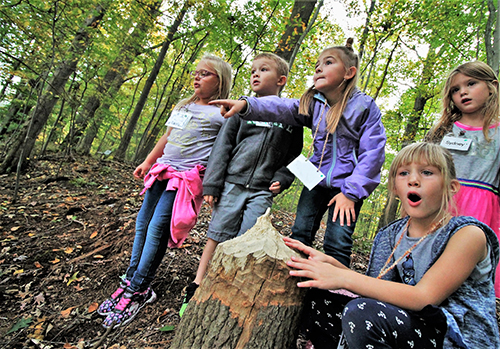
- Please let us know you’re coming in advance by contacting us by email or phone (616) 786-4847; this helps us ensure that the park and facilities are ready for a large group.
- Familiarize yourself with park rules Park rules and regulations may vary by property. For example, while visitors are not allowed off trail at parks, off trail hiking and exploration is allowed at open spaces.
- Follow Leave No Trace principles: Take only pictures, leave only footprints.
- Special events require a permit. Check here to see if you need a permit for the event you are planning.
- Do you need a facility for your visit? Ottawa County Parks has many rentable facilities
